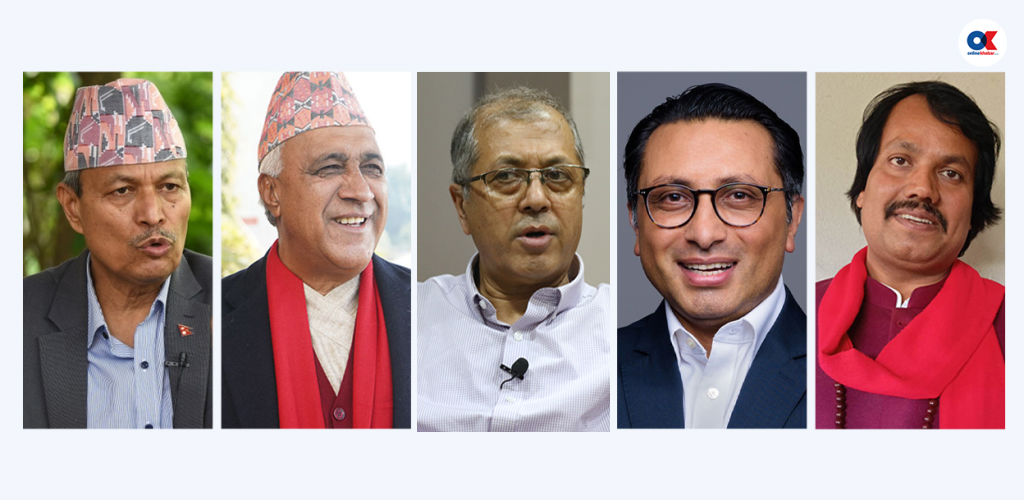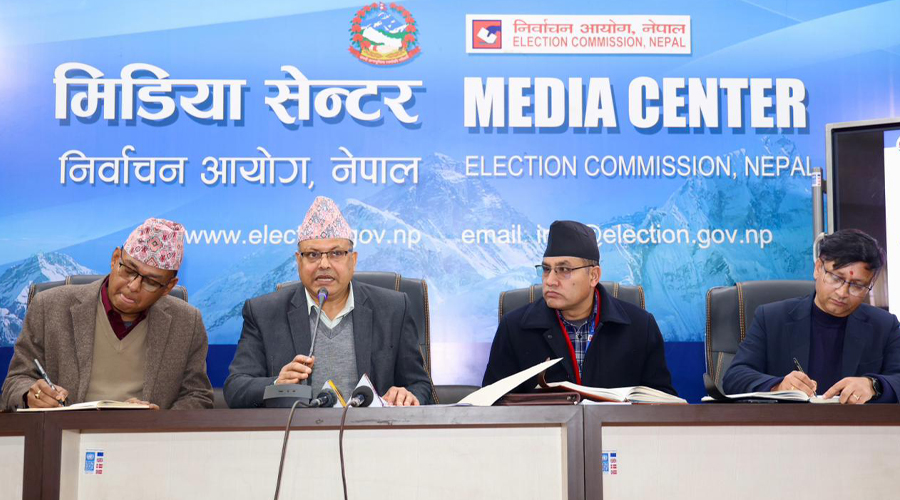On December 17, 2021, Finance Minster Janardan Sharma called a meeting of all ministries involved in development works and told them that the development expenditure had to be 30 per cent by mid-January.
“If you will not use the budget, I will send it to where it will be used,” he said to all the ministers and secretaries from different ministries.
A few weeks later, on January 3, the Finance Committee of the House of Representatives held a meeting regarding underspent development expenditure. In the meeting, the ministers and secretaries of various ministries told the committee how the Finance Ministry held their files for weeks.
“They should either tell us they don’t have funds or let us work by releasing the budget,” said one minister.
Minister for Physical Infrastructure and Transport Renu Kumari Yadav even went on to say how bureaucracy in Nepal was affecting development in the country. The ministry’s secretary Ravindra Man Shrestha added how the Finance Ministry was at fault for delayed development work as it had not insured when it was going to hand over the Rs 20.45 billion budget to the Infrastructure Ministry.
To no one’s surprise, the development expenditure didn’t even reach close to the 30 per cent mark set by the Finance Minister. In the first six months of the fiscal year, only 13.44 per cent of the development expenditure was spent. This was the lowest net spent in the past three years.
Following this, Minister Sharma called another meeting on February 1 and told secretaries from these ministries how he did not want to be calling them every time to say the same thing over and over again.
“This doesn’t give a good message,” he told them.
This is not the first time that there has been a tussle between the Finance Ministry and other ministries in regards to capital or development expenditure. The state of capital expenditure in the country of the past three decades is dreadful. But, the excuses for not being able to spend the budget get new every year.
“When we don’t spend the capital expenditure, it affects the income, savings, production and employment thus affecting the entire economy,” says a Finance Ministry official.
The faulty financial system

According to the Finance Ministry, the average spending of allocated budget in the last decade is 82.1 per cent. But, when it comes to capital/development expenditure, different ministries have only been spending around 70 per cent of the budget on average. This is taking place even after the budget is released 45 days before the start of the new fiscal year.
Despite this, almost all ministries try to finish the funds allocated to them in the last month of the fiscal year in a haphazard manner. This has started to raise questions about the financial discipline, allocation competence and execution capacity of people in these ministries.
According to data given by the Comptroller General’s office, in the past five years, 40 per cent of development expenditure was done during the last month of the fiscal year.
To clear things out, the Finance Ministry released a white paper in the first month of the current fiscal year, in which it stated why the allocated development budget was not being spent:
- Allocating budget without considering the capacity of the concerned ministry
- Allocating funds to populist programmes
- The lack of financial discipline resulting in ministries spending budget in the last month
- Not spending funds based on the work plan
- Assuring funds without keeping in mind the total budget
The National Planning Commission also highlighted a few reasons in its 2019/20 report on why the development expenditure was not being spent. The report states how the national pride projects take up almost the entirety of the budget while taking around 30 years to complete. Despite this, these pride projects continue to get the budget it wants, reads the report even though the extension of these projects has no clear legal foundation. These are some factors that have resulted in the budget not being spent properly, says the commission.
Let’s take a look a how the pride projects are faring. The government started to reserve a budget for Nijgadh Airport in the fiscal year 2015/2016. But, six years on, preliminary work on the project is still not complete. The commission says this is a result of starting a project before the detailed project report is prepared.
To ensure these projects are on the right path, the government does quarterly, half-yearly and yearly reviews of these projects. But, experts say that these reviews are just a formality. The commission itself did hold a review of these projects in the last fiscal year. These review meetings are chaired by the prime minister. But, these meetings rarely find solutions to why the projects are being delayed.
Another reason for the poor implementation of the development expenditure plan is a lack of coordination between government departments. The commission’s report also says that coordination does not take place even between the three tiers of the government.
Before a new project is added to the budget, it needs approval from the National Planning Commission. But, many government bodies do not take the commission’s approval and only go there after the project is included in the budget. This means the budget is set aside without detailed research.
Most of these projects are multi-year projects. Bu,t due to a lack of coordination with the planning commission, these projects do not match the periodic plan. This means new projects are started before the old ones are completed, which creates a lot of issues when drafting a budget in the following years.
Take the Kalanki-Thankot road project, for example. The project was implemented before the compensation was decided. Problems during compensation nearly caused the project to be scrapped entirely.
When projects like these cause limbo, the development expenditure allocated to these projects is given to another one in the final month (during the monsoon) resulting in the work being below par.
Incompetent, insufficient people
Another reason for the government not being able to spend the development expenditure is a delay in decision making, problems during land accusation and lack of desired construction material. Gautam Buddha International Airport, a national pride project, had to go through all of the hindrances mentioned above.
Another issue that plagues development work in Nepal is the lack of skilled human resources. Forest secretary Prem Narayan Kandel, a while ago, had said Nepal’s main problem was the unskilled human resources, which has not been addressed to date.
The planning commission’s report had stated things moved slowly in Nepal due to government employees not being motivated enough. To tackle this, the government has also not brought any incentive as these employees do not have the fear of getting the sack.
Another reason for the delay in spending development expenditure is different ministries trying to ensure that the project is given to the people they know.
The planning commission also says that immoral construction companies are also at fault. Normally, when a tender is obtained for a project, the construction company needs to fulfil the criteria. But, due to influence, these criteria are not being fulfilled, resulting in the project not completing on time. With the government not demanding accountability or taking action against those that do not complete projects on time, things have remained the same for years.
Locals’ obstruction has also halted many projects in Nepal, troubling the development expenditure system. To curb this, few hydropower projects have started to give locals shares in the companies to ensure they do not hinder the project. But, implementing this in projects like transmission lines, roads, railways, airports or other industries has not happened resulting in the projects being in limbo.
Crucial concerns of the current time
In Nepal, various bodies do not spend the allocated development expenditure on a certain project. But, there are also some projects that ask for more than that allocated money. This has created a lot of problems in the Finance Ministry.
This year, the government has to spend more than it thought it would have to purchase Covid-19 vaccines. It will also have to spend in excess of Rs 10 billion on the three levels of elections. The estimation is the cost will go over Rs 25 billion to conduct the polls. This includes administrative and security costs.
The government will also have to spend in excess of Rs 1 billion to repair damages incurred in the Melamchi Drinking Water Project during the monsoon of 2021. There is also demand for around Rs 15 billion for the reconstruction of buildings damaged in the 2015 earthquake. The Agriculture Ministry has also asked for a lot of money to import chemical fertilisers.
To manage everything, Finance Minister Sharma has warned of taking money away from government bodies that do not use development expenditure and giving it to those that will.
This has put the government in a position that it always has been: choosing current needs instead of development.



























